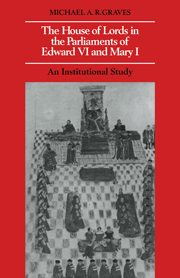Book contents
- Frontmatter
- Contents
- Dedication
- Preface
- Parliamentary sessions, 1547–8
- 1 Introduction
- 2 The composition of the House
- 3 The quality of the House
- 4 Attendance and activity, absenteeism and management
- 5 Cohesion and division
- 6 The Lords' inheritance: clerks and assistants to the House
- 7 The rules of business: procedure
- 8 The legislative record of the mid-Tudor Lords
- Abbreviations
- Appendix A Composition
- Appendix B Roll of the ‘actual’ members of the House of Lords, 1547–58
- Appendix C Attendance
- Appendix D Legislation
- Notes
- Select bibliography
- Index
6 - The Lords' inheritance: clerks and assistants to the House
Published online by Cambridge University Press: 03 May 2010
- Frontmatter
- Contents
- Dedication
- Preface
- Parliamentary sessions, 1547–8
- 1 Introduction
- 2 The composition of the House
- 3 The quality of the House
- 4 Attendance and activity, absenteeism and management
- 5 Cohesion and division
- 6 The Lords' inheritance: clerks and assistants to the House
- 7 The rules of business: procedure
- 8 The legislative record of the mid-Tudor Lords
- Abbreviations
- Appendix A Composition
- Appendix B Roll of the ‘actual’ members of the House of Lords, 1547–58
- Appendix C Attendance
- Appendix D Legislation
- Notes
- Select bibliography
- Index
Summary
The clerical organisation of the Upper House and the presence of a professional corps of judges and lawyers, on whose advice and assistance the lords spiritual and temporal could call, must be counted amongst the most important assets of the mid-Tudor House of Lords. In these respects it may even have been more adequately equipped than the Commons to fulfil the parliamentary functions of deliberation and legislation. This would not be surprising. The Lords was the historic nucleus of parliament, a fact reflected in its membership and in the very arrangement of the parliament chamber. The judges, king's serjeants-at-law, law officers of the Crown and masters of chancery together occupied the woolsacks in the middle of the chamber and were the official members of the king's continual or permanent council, his legal councillors. The lords spiritual and temporal represented the medieval great council, transformed by the growth of a theory of lay peerage which equated peers with lords of parliament, confined the temporal element of the magnum concilium to nobles, and yet enlarged it to comprehend the entire nobility. The throne was the perpetual reminder that parliament had originated as a royal assembly, an afforced meeting of the king's council. And there were also present, on the wool-sacks, the lord chancellor and his chancery clerks, who had nurtured parliament from its medieval origins. As parliament evolved into separate Houses, the great council ceased to be the nucleus, the essence, of parliament and became instead just one of the two Houses.
- Type
- Chapter
- Information
- The House of Lords in the Parliaments of Edward VI and Mary IAn Institutional Study, pp. 120 - 140Publisher: Cambridge University PressPrint publication year: 1981



